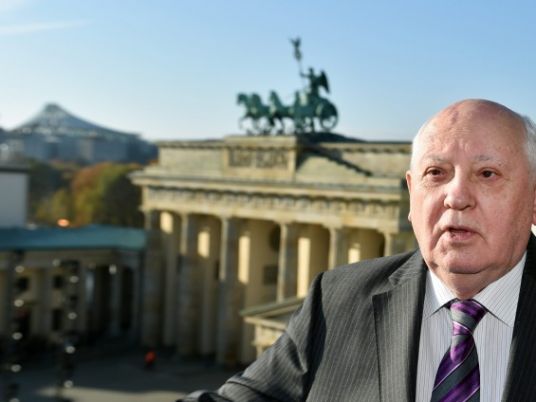
The world is on the brink of a new Cold War, former Soviet leader Mikhail Gorbachev warned on Saturday in Berlin, on the 25th anniversary of the fall of the Berlin Wall.
“I have always described myself as an optimist. But I have to admit that it’s very difficult to be optimistic in the current situation,” Gorbachev said at an international symposium in Berlin that gathered former ministers, top diplomats, intellectuals and foreign policy experts.
“European and international politics did not stand the test of renewal, of the new conditions of the global world,” the last leader of the Soviet Union said.
“Bloodshed in Europe and the Middle East against the backdrop of a breakdown in the dialogue between major powers is of enormous concern. The world is on the brink of a new Cold War. Some are even saying that it is already begun,” he stressed.
Gorbachev’s reform policies of glasnost (meaning openness) and perestroika (meaning restructuring) in the late 80s contributed to change, and led to the dissolution of the Soviet Union in 1991, marking the end of the Cold War..
The 83-year-old politician is highly respected in Germany, remembered for his decision to refrain from using force in 1989 at the time of the fall of the Berlin Wall. He did not interfere with the unification of Germany.
'Bush had doubts about Germany'
25 years after the fall of the Berlin Wall, Gorbachev has disclosed that during the late 80s, the U.K. and France had doubts about the unification of Germany.
He argued that the U.S. had also concerns about Germany, due to its role in the Second World War.
“I was in favor of a neutral Germany. President Bush objected. Why, are you afraid of Germans, he asked,” Gorbachev said.
“Bush said that Germany should be included, anchored in NATO. So that they could control it. I replied to him: It looks like it’s you who are afraid of them.”
Collapse of trust between West and Russia
Gorbachev criticized Western leaders for the “collapse of trust” between the West and Russia in the last two decades, which he said led to a tense and fraught environment blocking any decision at the U.N. Security Council.
He listed the enlargement of NATO, the dissolution of Yugoslavia, the independence of Kosovo, U.S.-led operations in Iraq and Libya, and developments in Syria as examples of what have undermined the trust built during the early 90s.
Gorbachev criticized the U.S. and Western countries for declaring victory rather than building new mechanisms and institutions for European security at the end of the Cold War.
“Taking advantage of Russia’s weakening and the lack of a counterweight, they claimed monopoly leadership and domination in the world, refusing to heed words of caution from many of those present here,” he said.
Call for reviving dialogue
Gorbachev called for the revival of dialogue and argued that Russian President Vladimir Putin would be also supportive of that.
“Today the foremost priority should be renewal of dialogue, regaining the ability to interact and to listen to and hear each other,” he said, urging Western decision makers to consider carefully the recent remarks of Putin at the Valdai Forum.
“Despite the harshness of his criticism of the West and of the U.S. in particular, I see in his speech a desire to find a way to lower tensions and ultimately build a new basis for partnership,” he stressed.
"Continuation of the current course could cause lasting damage to our relations, which have until now been exemplary. Let us remember without Russian-German partnership there can be no security in Europe," he added.
Relations between the West and Russia have been strained recently due to Russia's annexation of Crimea and Kremlin’s policies towards Ukraine.
Ahead of his visit to Berlin, Gorbachev told media that he would defend the policies of the Russian President Vladimir Putin during his talks in Berlin.
Gorbachev is set to participate at the official ceremony on Sunday to mark the 25th anniversary of Berlin Wall’s fall and he is to meet German political leaders, including Chancellor Angela Merkel.

